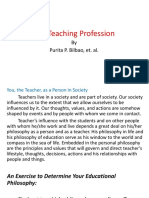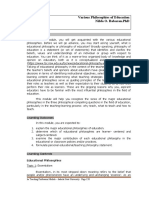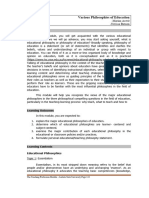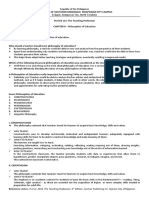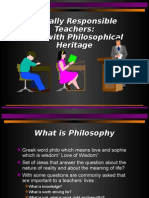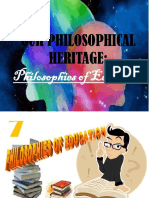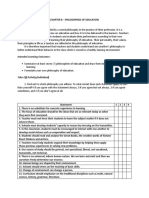Introduction To Philosophies of Education
Introduction To Philosophies of Education
Uploaded by
Grecii SarmientoCopyright:
Available Formats
Introduction To Philosophies of Education
Introduction To Philosophies of Education
Uploaded by
Grecii SarmientoOriginal Title
Copyright
Available Formats
Share this document
Did you find this document useful?
Is this content inappropriate?
Copyright:
Available Formats
Introduction To Philosophies of Education
Introduction To Philosophies of Education
Uploaded by
Grecii SarmientoCopyright:
Available Formats
Module 1
Introduction to Philosophies of Education
Module 1.1- Meaning of Philosophy
Intended Learning Outcomes
Discuss the meaning of philosophy
Enumerate and briefly present the different branches of Philosophy
Introduction:
A beginning teacher is often harried to meet the day-to-day demands of
students, parents, administrators, colleagues, school and off-school activities.
The demands of lesson planning, meeting classes, attending meetings and and
conferences, testing and grading leave a little time for reflection on his role in the
enterprise of education.
Teaching requires a careful blending of theory and practice. Theory
without practice is insufficient while practice without theory is aimless.
Questions like what shall I teach? How shall I teach? Shall I teach my students
to memorize facts and more facts or teach them to experiment so that they learn
to conserve traditions? Or shall I lead my students to question the status quo
and aim for change? To answer these questions, a teacher will be delving in the
philosophy of education, an intellectual base that supports educational
practices.
Meanings of Philosophy and Education
Philosophy in it literal sense means love of wisdom. In its broadest sense,
philosophy is a man’s attempt to think most speculatively, reflectively, and
systematically about the universe in which he lives and his relationship to that
universe. Its remarkable feature is its effort to evaluate the sum total of human
experience. Philosophy adds no new facts to existing knowledge. It examines the
facts provided by scientists and analyzes the meaning, interpretation,
significance and value of these facts. Most will accept the ideas that philosophy
is a systematic and logical examination of life so as to frame a system of general
ideas of which the sum total of human experience may be evaluated.
Philosophy provides a comprehensive systematic study which is
categorized into five major areas. Each area has important implications for the
goals and practices of education.
Areas of Philosophy
Epistemology deals with the nature of knowledge and knowing and is
closely related to methods of teaching and learning. Idealists see knowing or
cognitive learning as the recall of ideas that are latent in the mind. The most
appropriate method is the Socratic method where the teacher stimulates the
students by asking leading questions which elicit ideas hidden in the learner’s
mind. A teacher who used the realists formula of sensation and abstraction
would develop classroom activities that utilize sensory stimuli. The pragmatists
believe that people learn by interacting with the environment; hence, problem-
solving Is a very appropriate method of teaching and learning,
Metaphysics deals with the nature of reality and existence. Idealists see
reality in non-material or spiritual terms; realists see reality in an objective order
in educational philosophy; metaphysics relates reality to the context, experiences
and skills in the curricula. The social and natural sciences are good venues in
teaching reality to the learner.
Axiology deals with values. Axiology is divided into ethics and aesthetics.
Ethics examines moral values and the rules of right conduct. Aesthetics deals
with values in beauty and art. Parents, teachers and society reward certain
preferred behavior and punish behavior that deviates from the concept of what
is good, right and beautiful. Idealists and realists agree that the good, the
beautiful and the right are universally valid in all places at all times while
pragmatists believe that values are relative and vary in time and place.
Advance Organizer
Activity
Multiple Choice Quiz:
1. What is the origin of the word Education?
a. Word Educate
b. Edu and “Catum”
c. ‘E’ and ‘Catum’
d. None of these
2. Which of the following statements is correct?
a. Education is an art.
b. Education is a science.
c. It is neither an art nor science.
d. To some extent it is an art and to some extent it is a science.
3. What is called education acquired without any specific purpose, fixed
period and place?
a. Formal Education c. Indirect Education
b. Informal Education d. Individual Education
4. Which of the following sentences is correct about the nature of
teaching?
a. It is remedial.
b. It is diagnostic.
c. It is diagnostic as well as remedial.
d. All the above statements are correct.
5. What is the compulsory element of learning?
a. Tendency to know c. bright mind
b. Ability to read d. none of these
6. What is the place of principal in an educational institute?
a. Owner of the school c. Manager of the school
b. Founder of the school d. Over-all head of the school
7. If a student failed in any class what should be done to him?
a. He should be kept in the same class.
b. He should be advised to leave studies.
c. He should be given a chance to improve and sent to the next class
after he improves.
d. All the above methods are right.
8. Why are curriculum activities used in teaching?
a. To assist the teacher.
b. Make teaching easy.
c. To make teaching attractive.
d. To make teaching interesting, easy to understand and effective.
9. What are the three components of the educational process.
a. Direction, instruction, and skill
b. Teaching, learning and practice
c. Teacher, student and education
d. Education, teacher and books
10. What is teaching through deductive method?
a. From easy to difficult.
b. From macro to micro
c. From general to specific
d. From specific to general
Analysis
Abstraction/Generalization
Education refers very broadly to the total social processes that bring a
person into life in a culture. By living and participating in a culture, the youth
gradually becomes a recipient of and a participant in a culture. Education, in a
more formal and deliberate sense, takes place in the school, a specialized social
agency established to cultivate knowledge, attitudes (values) and skills in the
learner. The term informal education is simply incidental learning: learning how
to cross the street or wash dishes is learned by the child through observation.
The term non-formal education is used to label activities/programs to improve
the quality of life. These activities are literacy (for out-of-school youth and adults)
rural development, training for occupational skills and informative education.
The target clientele are the unemployed, the underemployed, those who never
had or had little schooling and technical workers who need to upgrade their
skills.
If education is to promote change for the better, the education has to turn
to philosophy to determine that “better” is for a particular segment of society or
for society as a whole. Educational philosophy then is the application of
philosophy to the study of all factors affecting the aims and goals of education,
its method, content and organization in terms of human values as they affect the
nature and purpose of man and society.
The curriculum includes all the experiences of the learner for which the
school assumes responsibility. In its broadest sense, the curriculum can be
defined as the organized experiences that a student has under the guidance and
control of the school. In a more precise and restricted sense, the curriculum is
the systematic sequence of courses or subjects that form the school’s formal
instructional program. For the traditional philosophies, the major goal of
education is the transmission and preservation of the cultural heritage. A
curriculum consists of skills and subject matter, the necessary tools in
transmitting, in learnable units, to the immature for the survival of civilization.
The subject matter is arranged in a hierarchy, with priority given to subjects
regarded as more general, hence, more significant. The more recent philosophies
are more concerned with the process of learning. The curriculum which follows
this idea makes use of activities and projects, and experimental and problem-
solving modes that are determined by the learner’s interests and needs.
Methodology of Instruction
Methodology is the process of teaching and learning by which the learner
is brought into relationship with the skills and knowledge that are specified and
contained within the curriculum. In the school, methods are the means or
procedure that a teacher uses to aid students in having an experience, mastering
a skill or process, or acquiring an area of knowledge.
Teacher and Learner
Formal education involves a teacher and a learner. This relationship is
based on the roles of the teacher and learner in the education process. In the
context of the subject-matter school (the traditionalists) the teacher is the
expressive recipient who must acquire and master this knowledge. Thus the
method of instruction depends upon the systematic organization of subject
matter. The progressionists look to the child’s needs and interests and make the
teacher a guide or a facilitator in the learning process.
The five major areas of philosophy are epistemology, metaphysics,
axiology, ethics and aesthetics. These major areas have to do with the resolution
of educational goals, content of education, organization of the curriculum,
teacher education, academic freedom, student discipline, freedom of expression,
social relationships, and the teaching-learning process.
Ethics, for example, will determine what is worth teaching, what the
content of the curriculum will be and what experiences will bring about desirable
behavior. In today’s classroom, would students in the elementary grades be
taught about condoms because of AIDS? What kind of values do we stress in the
curriculum, the traditional values like humility as against the progressive value
of aggressiveness? Epistemology will determine which curricula will be organized
and taught, what methods and techniques will be effective. In the teaching of
Mathematics in high school, for example, all areas like algebra, geometry, and
trigonometry are given beginning the first year and followed year after year in
increasing difficulty. About twenty years ago students took up algebra in the first
year, geometry in the second year, advanced algebra in the third year and
trigonometry it the fourth year. The same is true in the sciences. Metaphysics
will determine what and how to teach in the reality of the time and place we live
in.
You might also like
- QMS Change Request FormDocument2 pagesQMS Change Request FormSeni Oke100% (11)
- STAD01Document87 pagesSTAD01Aggelos Kotsokolos100% (1)
- The Teaching ProfessionDocument17 pagesThe Teaching ProfessionRJ Fraginal100% (1)
- Ganesha Pooja (Eng)Document23 pagesGanesha Pooja (Eng)satish kumarNo ratings yet
- Test Your Understanding of The PhilosophiesDocument3 pagesTest Your Understanding of The PhilosophiesRey Razel Cave100% (4)
- Five Philosophies of EducationDocument18 pagesFive Philosophies of Educationjazeeeh130% (1)
- Module 1.3Document3 pagesModule 1.3Grecii SarmientoNo ratings yet
- 6 Contemporary Theories To TranslationDocument20 pages6 Contemporary Theories To TranslationGrecii SarmientoNo ratings yet
- Name: Sarmiento, Grecilda S. 4 BSE-ADocument3 pagesName: Sarmiento, Grecilda S. 4 BSE-AGrecii Sarmiento100% (1)
- Slot MathDocument6 pagesSlot MathAngela BrownNo ratings yet
- Lesson 1 Reading MaterialsDocument5 pagesLesson 1 Reading MaterialsJake Kiervy Salamo GetesNo ratings yet
- Philosophy of Education Comprehensive ExamDocument3 pagesPhilosophy of Education Comprehensive ExamJuanito Jr Icalla100% (4)
- Philosophies of EducationDocument10 pagesPhilosophies of Educationmelchie100% (1)
- Lesson 2 Philoo BasesDocument4 pagesLesson 2 Philoo BasesLiegen SheilaNo ratings yet
- THURSDAY ACTIVITY (AutoRecovered)Document5 pagesTHURSDAY ACTIVITY (AutoRecovered)Maela Pollen Elumba YemaNo ratings yet
- Test-Drill-II-Prof.-Ed Edited For PDFDocument23 pagesTest-Drill-II-Prof.-Ed Edited For PDFrowenarodrigo22No ratings yet
- Philosophy of EducationDocument3 pagesPhilosophy of EducationRyu BentsNo ratings yet
- Lerning Insights in The Philosophy of EducationDocument8 pagesLerning Insights in The Philosophy of EducationBernard RosarioNo ratings yet
- Various Philosophies of Education Nilda O. Babaran - PHDDocument13 pagesVarious Philosophies of Education Nilda O. Babaran - PHDCONSTANTINO, JELAY P.No ratings yet
- Philosophy of education New_035746_083033Document32 pagesPhilosophy of education New_035746_083033oswardmathias006No ratings yet
- R-Educ 201Document34 pagesR-Educ 201Kwin KwinNo ratings yet
- Philosophies of EducationDocument17 pagesPhilosophies of EducationDr. Ritchan Roy A. BorjaNo ratings yet
- Various Philosophies of EducationDocument14 pagesVarious Philosophies of Educationpempleo254No ratings yet
- Realism: Subjective Long QuestionsDocument11 pagesRealism: Subjective Long QuestionsAnam RanaNo ratings yet
- Subject: ED 200 Subject Description: EDUCATIONAL PHILOSOPHYDocument3 pagesSubject: ED 200 Subject Description: EDUCATIONAL PHILOSOPHYRichie MacasarteNo ratings yet
- Principles of Teaching and LearningDocument7 pagesPrinciples of Teaching and LearningUnknown100% (2)
- Analysis of Personal Educational Philosophy and An Existing PhilosophyDocument11 pagesAnalysis of Personal Educational Philosophy and An Existing Philosophysharee cridlandNo ratings yet
- Philosophy of EducationDocument25 pagesPhilosophy of Educationmariaflorina91No ratings yet
- Philosophical Foundations of EducationDocument12 pagesPhilosophical Foundations of EducationJazmin Kate Abogne100% (1)
- Philosophical Foundations of EducationDocument12 pagesPhilosophical Foundations of EducationJazmin Kate Abogne100% (1)
- PhilosophyDocument6 pagesPhilosophyapi-5811714090% (1)
- Philosophical Foundation of EducationDocument25 pagesPhilosophical Foundation of EducationRose BrewNo ratings yet
- Module 8Document13 pagesModule 8Jinky Mae VelascoNo ratings yet
- Seven Philosophies of EducationDocument4 pagesSeven Philosophies of EducationKrystelle Joy Zipagan100% (2)
- Discussion Question #3Document5 pagesDiscussion Question #3Angel Mae H. SolaminNo ratings yet
- Philosophies of EducationDocument44 pagesPhilosophies of EducationGenelyn JamisolaNo ratings yet
- Proded ReportDocument6 pagesProded ReportRafael CortezNo ratings yet
- PhilosophyDocument4 pagesPhilosophyKristia Mae CellonaNo ratings yet
- Module 2Document15 pagesModule 2Azwar InraNo ratings yet
- My Final Answer To Psycho and Philo...Document6 pagesMy Final Answer To Psycho and Philo...Evangelene Esquillo SanaNo ratings yet
- Your Philosophical HeritageDocument3 pagesYour Philosophical HeritageGrace Tejano Sacabin-Amarga100% (1)
- Edition. Lorimar Publishing Inc. Quezon City, PhilippinesDocument3 pagesEdition. Lorimar Publishing Inc. Quezon City, Philippinesrheinz bryan100% (3)
- Module 11 - Philosophies of EducationDocument7 pagesModule 11 - Philosophies of EducationJanissaries NivercaNo ratings yet
- Educ 303, Unit 1 - The Teacher As A Person in The SocietyDocument25 pagesEduc 303, Unit 1 - The Teacher As A Person in The SocietyAngela GamayonNo ratings yet
- Lesson 1 The Teacher Rich With Philosophical HeritageDocument22 pagesLesson 1 The Teacher Rich With Philosophical HeritageFely B. Balgoa50% (4)
- Strategies For TeachingDocument21 pagesStrategies For TeachingTiktok YouTubeNo ratings yet
- JUSTINE NERI M. MORADILLA - Reflection On Realism, Behariorism and MarxismDocument7 pagesJUSTINE NERI M. MORADILLA - Reflection On Realism, Behariorism and MarxismJUSTINE NERI MORADILLANo ratings yet
- Teaching Prof. Philosophies of EducatonDocument38 pagesTeaching Prof. Philosophies of EducatonChristian Mark MangubatNo ratings yet
- Telephone No. (056) 211-0200 Email-Ad: Ssc@sorsogonstatecollege - Edu.phDocument8 pagesTelephone No. (056) 211-0200 Email-Ad: Ssc@sorsogonstatecollege - Edu.phEmily Despabiladeras DulpinaNo ratings yet
- Educ 201 First Major Exam 2019Document3 pagesEduc 201 First Major Exam 2019Farzeah JaafarNo ratings yet
- Affects The Society: Intellectual Development of The StudentsDocument11 pagesAffects The Society: Intellectual Development of The StudentsBrile SuaNo ratings yet
- Allama Iqbal Open University: Assignment No 1Document20 pagesAllama Iqbal Open University: Assignment No 1Ahsan NangrajNo ratings yet
- Dean ReviewerDocument151 pagesDean Reviewerrodriguezlyka4No ratings yet
- Philosophies About Teaching ProfDocument55 pagesPhilosophies About Teaching Prof아미Alliyah100% (1)
- Chapter 8 Philosophies of EducationDocument18 pagesChapter 8 Philosophies of EducationJenny C. GalonoNo ratings yet
- Unit 8 Module PDFDocument6 pagesUnit 8 Module PDFTRICIA JEAN NICOLE MENDOZANo ratings yet
- Educ 2a PDFDocument16 pagesEduc 2a PDFZetroc JessNo ratings yet
- Justification 1Document3 pagesJustification 1api-297284721No ratings yet
- DeepenDocument6 pagesDeepenlerma bisagarNo ratings yet
- Curriculum Development 6Document9 pagesCurriculum Development 6Teacher SallyNo ratings yet
- ReportDocument4 pagesReportapi-457372742No ratings yet
- Module 1 Educ 3Document29 pagesModule 1 Educ 3Selle Albero100% (1)
- Final Term Lecture and ActivitiesDocument12 pagesFinal Term Lecture and ActivitiesRonalyn AgustinNo ratings yet
- Educ 5a Week 1 ModuleDocument5 pagesEduc 5a Week 1 ModuleJee En BeeNo ratings yet
- Postest Answer Sheet Prof Ed9 PDFDocument20 pagesPostest Answer Sheet Prof Ed9 PDFJonathan RacelisNo ratings yet
- How To Be a Great Teacher: Your Step-By-Step Guide To Teach Students EffectivelyFrom EverandHow To Be a Great Teacher: Your Step-By-Step Guide To Teach Students EffectivelyNo ratings yet
- Humanizing Classroom Management: Restorative Practices and Universal Design for LearningFrom EverandHumanizing Classroom Management: Restorative Practices and Universal Design for LearningNo ratings yet
- Lesson 5. Assignment PDFDocument2 pagesLesson 5. Assignment PDFGrecii SarmientoNo ratings yet
- Module 1.3-Reconstructionism Intended Learning OutcomesDocument2 pagesModule 1.3-Reconstructionism Intended Learning OutcomesGrecii Sarmiento0% (1)
- Fs 5Document1 pageFs 5Grecii SarmientoNo ratings yet
- Module 1.2 - Idealism Intended Learning OutcomesDocument2 pagesModule 1.2 - Idealism Intended Learning OutcomesGrecii SarmientoNo ratings yet
- ProfEd 313Document1 pageProfEd 313Grecii SarmientoNo ratings yet
- Basic Laws On The Professionalization of TeachingDocument86 pagesBasic Laws On The Professionalization of TeachingGrecii SarmientoNo ratings yet
- Episode 4. The Teacher As A PersonDocument13 pagesEpisode 4. The Teacher As A PersonGrecii SarmientoNo ratings yet
- List of Object Types - SAP Business One - SAP Blogs PDFDocument22 pagesList of Object Types - SAP Business One - SAP Blogs PDFCristhian MercadoNo ratings yet
- 02 - Dominique Barthelemy - The Feudal Revolution. Debate I (Past and Present, 152, 1996)Document10 pages02 - Dominique Barthelemy - The Feudal Revolution. Debate I (Past and Present, 152, 1996)carlos murciaNo ratings yet
- VBS Fearless Youth Teacher - S Manual - EnglishDocument50 pagesVBS Fearless Youth Teacher - S Manual - EnglishBless GelyNo ratings yet
- Daily Newsletter Feb2Document10 pagesDaily Newsletter Feb2amjadyusuf118No ratings yet
- Pirate+Borg EdmundDocument1 pagePirate+Borg EdmundamamNo ratings yet
- Subhamsharaffflipkart 190214071150Document51 pagesSubhamsharaffflipkart 190214071150manoj kumar DasNo ratings yet
- Jee 2008 Results-Press NoteDocument2 pagesJee 2008 Results-Press NoteVinay KumarNo ratings yet
- Translated by Jampas, Jessel: William ShakespeareDocument3 pagesTranslated by Jampas, Jessel: William ShakespeareJessel JampasNo ratings yet
- Paula Fredriksen, Pagan Justification by Faith PDFDocument9 pagesPaula Fredriksen, Pagan Justification by Faith PDFMik3reyes100% (1)
- Cruz, Jermaine Dale - VAEDDocument3 pagesCruz, Jermaine Dale - VAEDJermaine Dale CruzNo ratings yet
- Sample Article in Outpatient DepartmentDocument2 pagesSample Article in Outpatient DepartmentRodney Beltran SubaranNo ratings yet
- Case Notes - Lemos V Coutts and OjjehDocument30 pagesCase Notes - Lemos V Coutts and OjjehJYhkNo ratings yet
- Francisco Abarientos ArrangementsDocument5 pagesFrancisco Abarientos ArrangementsAndrei BucoNo ratings yet
- Revealing The Sons of ElohimDocument37 pagesRevealing The Sons of ElohimCraig Peters100% (1)
- Seduction Strategy 13 (NSFW)Document6 pagesSeduction Strategy 13 (NSFW)namjoonleftoenailNo ratings yet
- Grammar Check 4. InversionDocument5 pagesGrammar Check 4. Inversionlpqd31No ratings yet
- What Is Contemporary Literature?Document3 pagesWhat Is Contemporary Literature?Nilda DiwagNo ratings yet
- Ship's Agents and AgencyDocument21 pagesShip's Agents and AgencyAmin Al Qawasmeh100% (1)
- MCOM Part-I Result 2018Document36 pagesMCOM Part-I Result 2018Pratiyush KumarNo ratings yet
- Death Save Repeat - Adventure BookDocument12 pagesDeath Save Repeat - Adventure Booktalanjones2000No ratings yet
- Vacancy Announement - Nepal Airlines Corporation-HKGDocument2 pagesVacancy Announement - Nepal Airlines Corporation-HKGArpana KhadkaNo ratings yet
- Map9 q4 Music AssessmentDocument4 pagesMap9 q4 Music AssessmentJovelyn A. MalizaNo ratings yet
- 16 01 15 SDI Scottish Offshore Companies Supply Chain BrochureDocument52 pages16 01 15 SDI Scottish Offshore Companies Supply Chain Brochureskywalk189100% (1)
- Juvenile Justice in IndiaDocument7 pagesJuvenile Justice in IndiaShard DattNo ratings yet
- Viết Lại Câu Đáp ÁnDocument23 pagesViết Lại Câu Đáp Ánngoa8184No ratings yet
- Assignment INB 301Document21 pagesAssignment INB 301Rohan MalikNo ratings yet


